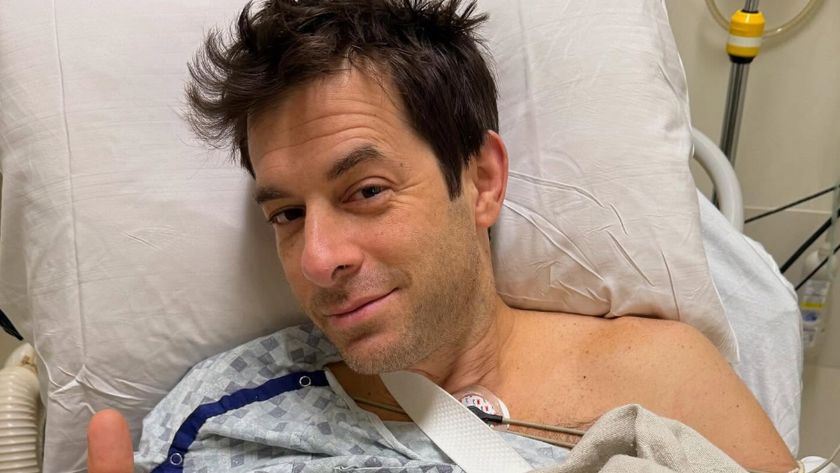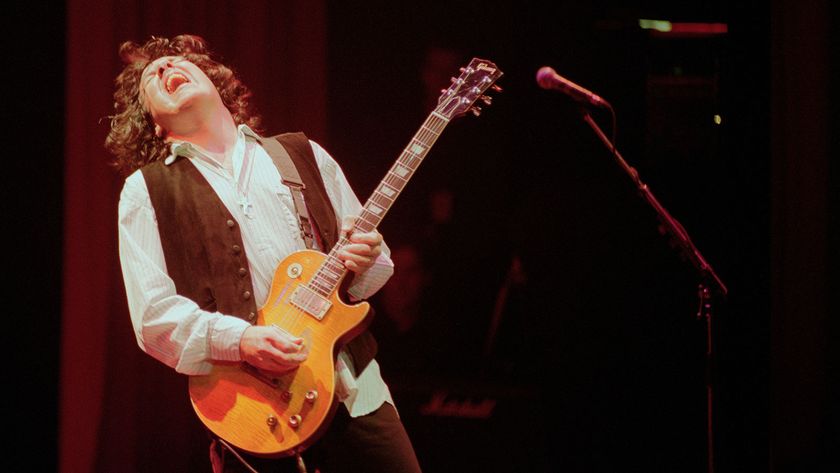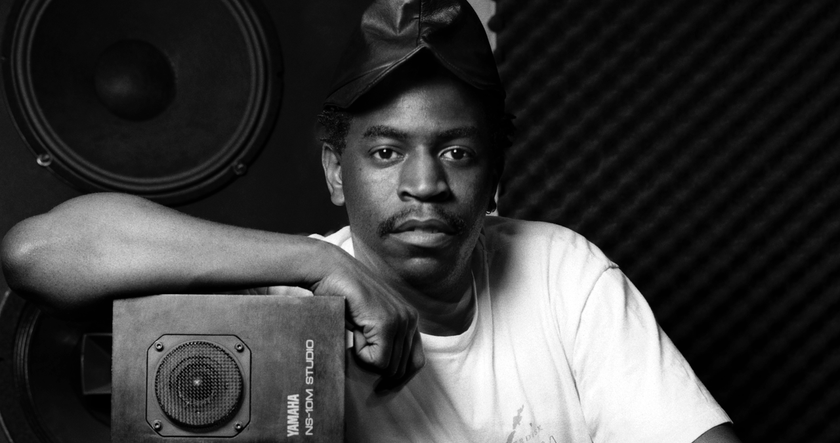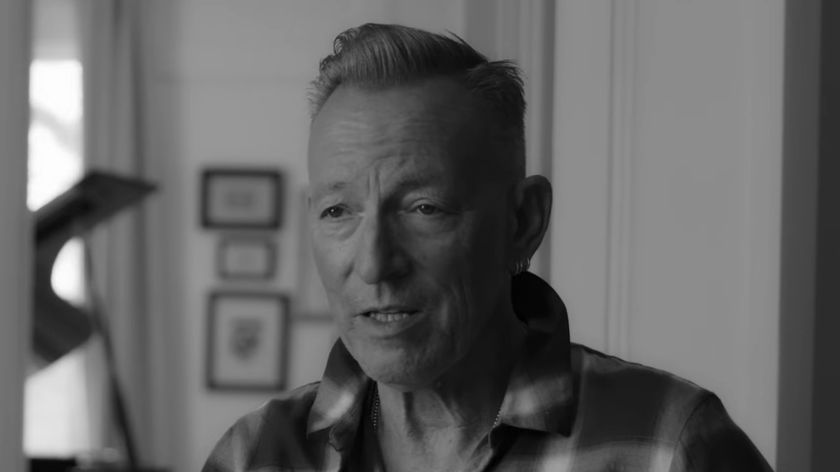Avenged Sevenfold talk songwriting and Hail To The King
"We're trying to renovate metal"

Avenged Sevenfold talk songwriting and Hail To The King
It's make or break time for Avenged Sevenfold. As they unleash their sixth album, Hail To The King, they sit on a pivot point between arena-filling heavyweights and the fabled ‘next level’ of hard rock and metal – a sparsely populated echelon of festival headliners and stadium-fillers home to the likes of Metallica, Iron Maiden and Guns N’ Roses.
There’s talk of Avenged ‘carrying the torch’ for modern metal, but to join those ranks, they need to produce an album that could one day be regarded as a classic and fill the sizeable songwriting shoes of deceased drummer Jimmy ‘The Rev’ Sullivan. There’s only one certainty: whichever way things tip, it’s going to be one hell of a ride.
Talking to lead guitarist Synyster Gates and rhythm man Zacky Vengeance over two days – first at Warner Bros’ Kensington HQ, then in a marbled hotel suite overlooking Hyde Park – it occurs to TG just how big the Californian metallers have become. Completed by bassist Johnny Christ, vocalist M Shadows and new drummer Arin Ilejay, the band have gone from being the ugly ducklings of the Huntington Beach hardcore scene to arena-dominating metal swans. Every step of the way they’ve delighted in spanning genres, taking gambles and, as Synyster Gates succinctly puts it, being a band that does “whatever the f**k they want”.
“Ever since we put out Sounding The Seventh Trumpet, we’ve gotten it all!” explains Zacky. “People said, ‘They’re not hardcore!’ Or when Matt started singing on Waking The Fallen they said, ‘That’s not metal.’ Then, when Jimmy died, somehow we’re headlining festivals around the world and we’re the band that could ‘carry the torch’. So for this album it seemed natural to throw everyone another curveball.”
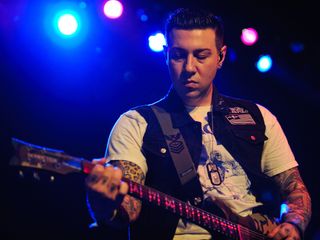
Writing the record
The ‘curveball’ is that Hail To The King is a record so steeped in classic metal you half expect it to include a foil-wrapped trouser cucumber.
Avenged fans are used to change, but this is a big evolution. The songwriting is infinitely more mature, the solos more refined and the production, courtesy of Mike Elizondo, more fierce and dynamic than ever before.
“We knew right away that we wanted to make a riff-based big-sounding record,” explains Synyster. “We’ve done it all with the duels and that was cutesy, progressive, whatever – we just wanted to have fun with it – but this time we wanted to really make a serious heavy metal rock record.”
As Syn and Zacky mention records such as The Black Album, Number Of The Beast and Back In Black, it becomes clear that the benchmarks the band have set themselves are astronomically high. Identifying the common threads in those albums is a difficult task in itself, but the challenge was exasperated without The Rev (who passed away during the writing of 2010’s Nightmare).
“Previously, we’d have Jimmy throwing in his three or four songs and they’d be perfect and take a huge weight off,” says Synyster. “But we didn’t have that [this time]. We were supposed to go to the studio on 1 January, but it got pushed back [to April] because the workload was significantly harder.”
Although the band work as a team on everything, M Shadows and Synyster have always penned the bulk of the band’s material, but the guitarist says the Rev’s knack for a single (he penned tracks Welcome To The Family, Almost Easy and Afterlife, to name but a few) was “outside of everyone’s wheelhouse”. Eventually, bassist Johnny Christ started to chip ideas in and having agreed to be “extremely, brutally honest” with each other, the group decided to gut both their sound and their approach to songwriting.
“[In the past] you would come up with something outrageous and you could stick it in anywhere,” admits Syn. “Certain parts could become almost interchangeable and that’s the last thing we wanted with this album. What we wanted is if you hear one measure of a song, you’d know exactly what it was right away.”
“We were trying to shed the layers,” says Zacky. “We’re notorious for laying guitars upon guitars and stacking vocals upon vocals, but it takes away from the true power of what we aim to do for this record.”

Stripping back to basics
Power is an appropriate word. Hail To The King sounds enormous.
Planets combines epic brass parts with Metallica brutality, not to mention a chorus that we can see inspiring some huge live throwdowns. Elsewhere, Coming Home launches with Maiden bombast before morphing into a bluesy rock ballad. Whatever they’ve done, it’s worked.
“We needed to make a record like this,” reckons Syn. “This was a huge challenge for us. We even tried writing an overly progressive song – something that, at that time, we felt was quintessentially ‘Avenged’.
"But we couldn’t do it. We were having so much fun challenging ourselves to create the best melodies, the best arrangements, the best drum parts, that we just had no interest in these ‘part-part-part’ songs.”
For a band that so gleefully experiment, space, it seems, really was Avenged Sevenfold’s final frontier.
“For this album, the rhythms are much more simplistic,” elaborates Zacky. “And, being a guitarist who always wanted to be a guitarist solely to get on stage and play in front of as many people as possible, as loud as possible, it’s a dream come true.”
Ironically, and because life can be a bit of dick like that sometimes, simplifying the rhythms and stripping out most of the duo’s trademark duelling lead lines has presented a whole other set of challenges.
“It’s actually much more difficult than people would imagine,” says Zacky. “Going back and listening to songs played with such feel, there’s a complete art to that in itself. The guitars have to pull on the drums just enough to the point where it creates this sound that resonates with people. [Whereas] if you just hammered it onto a grid in Pro Tools, it wouldn’t be the same.”
Just as Zacky has found the pocket in his rhythm, playing Hail To The King sees Synyster Gates’ finest work to date as a lead guitarist. He’s always been a technical wizard, but this is the record where Syn has learned to play with real feel. The GN’R-inspired Doing Time sees the lead maestro embrace bruising Slash-style blues, This Means War is wailing whammy bars galore, and the twisted Requiem recalls Zakk Wylde’s wah work.
“I wanted the solos to reflect these incredible grooves laid down,” says Syn. “We started listening to Dimebag Darrell, Eddie Van Halen, guys who just have unordained feel and groove to them, as well as swagger...”
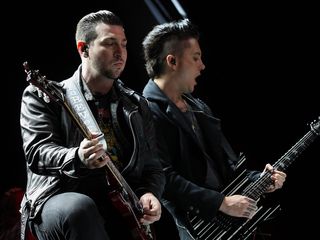
The ultimate amp shoot-out
Once again, Syn’s “band buddy”, Zacky, sat side-by-side with him throughout the solo writing process, subjected to his friend’s amp set to 11 for days on end in an effort to help him “sift through my horse s**t”.
“He really helped me with a lot of the solos,” says Syn. “I really wanted to delve into the soul of it more. And – with a little help from my friends – I think that message was really conveyed. It took me right out of my comfort zone each time.”
Syn and Zacky’s playing may now have more ‘feeling’ to it than a weekend with Silvio Berlusconi, but their tone has also been thoroughly spring cleaned. Gone are the squishy, over-compressed sounds of old Avenged and in their place are Hetfield- rivalling crunch monsters.
“We wanted to find the best guitar tones possible,” says Syn. “So we did a 25-combo shoot-out between all of these popular amps, boutique amps and my Hellwin amp line [see ‘Signature Syn’, p40], then we did a blind taste test. Everybody voted until we came to a unanimous decision – and it was my Hellwin amp and cab that sounded the best! It was one of the coolest days of my life.”
“It really happened and it’s insane,” confirms Zacky, usually a Jet City endorsee. “So we stuck with it and then just stuck with our signature guitars. Those seem to be the winners all the time on pretty much all of our albums. Schecter’s been good to us and given us so many variations of our signature guitars that we’ve really dialled it in playability wise.”
For Syn’s part, he describes using his Schecter model as a “no brainer” these days, which is probably fair given that he says he’s used it for every record since he first got it.
“It plays good and I’ve always loved the tone,” he tells TG. “The body of the guitar is huge, so it just resonates so well. Then the thin but hot-sounding [Seymour Duncan] Invader pickups work hand-in-hand.”
There are a few conspiracy stories around brand endorsements, but despite the fact that Avenged have got signature gear coming out of their eyeballs, there’s never a guarantee that it’ll make an album.
“We always do what’s best for the song,” explains Zacky. “If it means throwing away an entire song, then we throw away the song. If it means getting our feelings hurt because we’re not going to use our amp or our particular guitar, then we’ll do that.”

Achieving riff critical mass
There are other far darker secrets to the sound of Hail To The King, too.
While the band got scholarly and dug their way back through past classic albums, another more shocking common thread emerged – you might want to brace yourself for this one – the biggest-sounding records turn the guitars down.
“I don’t want to give away all of our studio tricks, but that’s what makes the guitar riffs sound massive: bringing them down in the mix,” explains Zacky. “It makes it heavier because you’re incorporating a pounding drum beat and the bass to sit behind it. If you listen to Metallica’s Black Album, it’s so riff-orientated, you think the guitars are just sitting so loud, but really the drums are probably the loudest instrument on the entire recording.”
We’re glad Zacky mentions The Black Album. The Metallica classic is clearly a big influence on the first part of the record. In fact, we fully expect the same crowd that accused Avenged of not being metal to come full circle and now accuse them of sounding too Metallica.
“We’re certainly influenced by it,” says Zacky. “I’ll never say, ‘On this album we’re slowing down and playing one-two beats because we were listening to some obscure band.’ We love Metallica, we love The Black Album.”
Avenged have always been open about the bands they admire, not least Metallica, but what’s the difference between an album with classic influences and a cynical attempt to copy a classic and force a commercial breakthrough?
“Long f**king hours!” says Synyster. “When you begin, that’s what that s**t sounds like and some really good songs had to be ditched because it was an Alice Cooper song, or an AC/DC song. You don’t realise it, but then you play it for your friends and family they’re like, ‘Oh, that’s AC/DC’ and you’re like, ‘F**k.’”
“I hear a ton of bands trying to sound like Metallica and I’m the first one to call ‘bulls**t’ on it,” adds Zacky. “But what I truly feel in my heart is that we’re trying to renovate metal. To give it more of an old-school approach.”

Carrying the metal flame
Hail To The King comes at a time when most of the metal fraternity is focusing on super progressive polyrhythms or extreme djent tones.
Going back to the old-school is yet another gamble, but then gambles always seem to pay off for Avenged and we suspect this one will, too. There’s talk of them being the band that could seize the metal mantle, headline festivals like Download and generally become international über-stars.
“There’s definitely a lot of talk,” says Syn, “People hear the word ‘classic’ and there’s been whispering about, ‘Are they carrying the torch?’ The bottom line is... that we happen to put in the craziest, biggest rock show around right now and we believe this to be a f**king next- level, for us, record: it’s the most brutal, biggest kick-in-the-f**king-nuts record that you’ll hear right now.”
Avenged are already living out their dreams, they already own nice houses, and they don’t have to worry about buying guitars any more. The ‘next level’ goes beyond all of that. This is about taking a stand in an era where bearded guitarists are more likely to be found fronting Mumford & Sons than metal bands.
“I hope that a whole group of metal bands are able to carry the torch,” says Zacky, getting fired up. “I don’t want to see these huge festivals handed over to bands that stomp and clap and blow into jugs and play the f**king washboard!
"I’m willing to do anything I can, whether it’s blowing s**t up, or playing guitar 20 hours a day... If we can carry the torch and we’re the band that needs to do it, then we need to do it. But if it’s not us, I hope it’s somebody else. And I hope they let us open for them!”

Signature Synyster
Unveiled at NAMM this year, Synyster’s signature Schecter Hellwin amp is at the heart of Hail To The King’s tone. Developed in conjunction with legendary amp designer James Brown (the man behind the 5150), Syn spent two years working on it.
“I wanted it to have this incredible break-up but not lose any of that fluidity, especially when you’re doing legato stuff,” he explains. “The other huge thing for me was clean tones. It’s the first thing I had qualms with on other [heavy] amps. James nailed that right away. The other stuff took a little longer, but we got it and it’s a f**king incredible amp.”
According to Syn, the Hellwin USA 100, which retails at £2,349, is just the start and more affordable options could well be in the pipeline.
“We spared no expense,” he says. “I have to admit that I’m not stoked that it’s that expensive an amp, but I couldn’t not have MIDI on it, etc... But this is the beginning of a long line of amps. I want to put out great jazz amps, punk amps – whatever I’m feeling. I really want to start the next level of live amps, so it’s definitely possible.”

Matt is a freelance journalist who has spent the last decade interviewing musicians for the likes of Total Guitar, Guitarist, Guitar World, MusicRadar, NME.com, DJ Mag and Electronic Sound. In 2020, he launched CreativeMoney.co.uk, which aims to share the ideas that make creative lifestyles more sustainable. He plays guitar, but should not be allowed near your delay pedals.
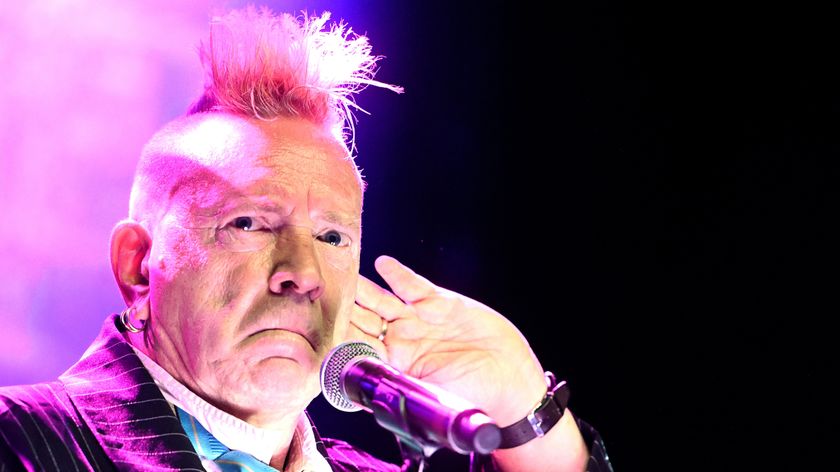
“Let them wallow in Walt Disney woke expectations”: John Lydon’s message to the reformed Sex Pistols
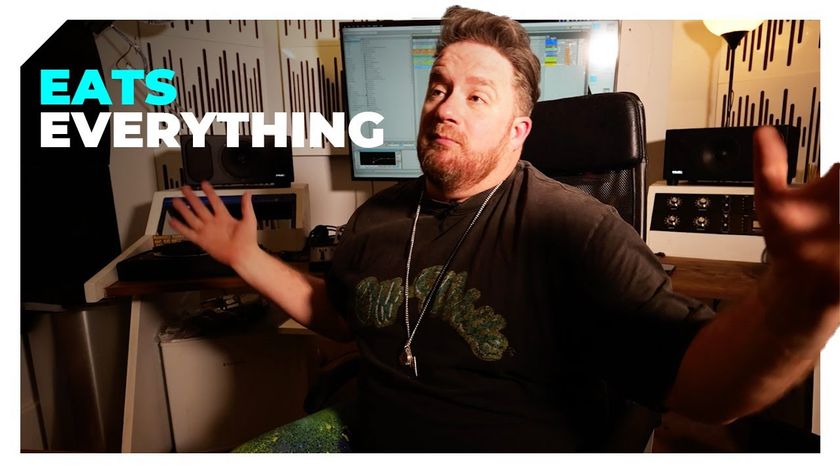
“Entrance Song is a massive 808 sub and a 909 kick. Those two shouldn’t work together - I’m not sure they were even in key”: Eats Everything on his ever-changing approach to production and DJing

“Let them wallow in Walt Disney woke expectations”: John Lydon’s message to the reformed Sex Pistols

“Entrance Song is a massive 808 sub and a 909 kick. Those two shouldn’t work together - I’m not sure they were even in key”: Eats Everything on his ever-changing approach to production and DJing



